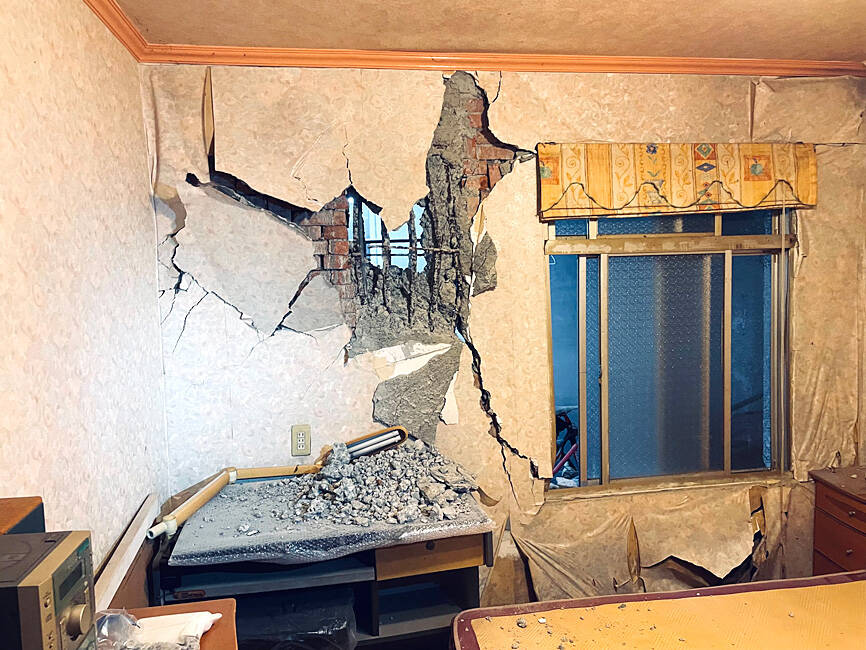The National Land Management Agency doled out subsidies to 70 projects to strengthen buildings against earthquakes in nine administrative regions from January to last month, it said on Tuesday.
The quake-proofing projects consisted of 20 in Taipei, 16 in New Taipei City, 10 in Taitung County, eight in Tainan, six in Pingtung County, four in Hualien County, three in Yilan County, two in Yunlin County and one in Taichung, including completed and ongoing projects, the agency added.
The three completed projects in Hualien survived the April 3 earthquake, which measured 7.2 on the Richter scale, with no signs of structural damage, the agency said.

Photo courtesy of the New Taipei City Public Works Department
Taiwan revamped its building code after the catastrophic 921 Earthquake, which resulted in a large improvement in safety standards for buildings across the nation, Taiwan Structural Engineers Association executive director Chiang Shih-hsuang (江世雄) said.
The 921 quake, which occurred on Sept. 21, 1999, measured 7.3 on the Richter scale and left 2,456 people dead and 10,718 injured, and destroyed 53,661 houses.
Despite the nation’s best efforts, the earthquake resistance of many concrete structures 30 years or older remains less than ideal, while structures nearing the end of their 50-year service life need to be torn down, Chiang said.
Reinforced brick, wood and stone construction of all kinds, many of which are older, need to be comprehensively re-examined for their ability to withstand quakes, he said.
An example of a common unsafe building design is structures at street corners with ground-level shop fronts on both sides with a glass facade, Chiang said.
Buildings with excessive volumes of empty internal space, such as big lobbies with tall ceilings, are another example of popular architectural styles that are highly risky, he added.
These types of buildings suffer from a lack of structural walls and pillars relative to their size and can be found all over Taiwan, Chiang said.
About 9.19 million properties are registered as residential buildings, of which 65.53 percent are made of concrete and 18.4 percent are made of reinforced brick, government data showed.
Older buildings in Taiwan often feature ground levels designed to yield a maximum of floor space and emphasize openness and lighting, said Andy Huang (黃舒衛), director of Landlord Representation Services at Colliers International Taiwan.
These practices, in many cases, violate safety codes, resulting in structures that must be overhauled to comply with the more rigorously written and enforced modern safety laws, Huang said.
As outdated buildings are the least likely to attract tenants, landlords owning unsafe properties often lack money to refurbish them, creating a vicious cycle, Huang added.

Chinese Nationalist Party (KMT) Chairman Eric Chu (朱立倫), spokeswoman Yang Chih-yu (楊智伃) and Legislator Hsieh Lung-chieh (謝龍介) would be summoned by police for questioning for leading an illegal assembly on Thursday evening last week, Minister of the Interior Liu Shyh-fang (劉世芳) said today. The three KMT officials led an assembly outside the Taipei City Prosecutors’ Office, a restricted area where public assembly is not allowed, protesting the questioning of several KMT staff and searches of KMT headquarters and offices in a recall petition forgery case. Chu, Yang and Hsieh are all suspected of contravening the Assembly and Parade Act (集會遊行法) by holding

PRAISE: Japanese visitor Takashi Kubota said the Taiwanese temple architecture images showcased in the AI Art Gallery were the most impressive displays he saw Taiwan does not have an official pavilion at the World Expo in Osaka, Japan, because of its diplomatic predicament, but the government-backed Tech World pavilion is drawing interest with its unique recreations of works by Taiwanese artists. The pavilion features an artificial intelligence (AI)-based art gallery showcasing works of famous Taiwanese artists from the Japanese colonial period using innovative technologies. Among its main simulated displays are Eastern gouache paintings by Chen Chin (陳進), Lin Yu-shan (林玉山) and Kuo Hsueh-hu (郭雪湖), who were the three young Taiwanese painters selected for the East Asian Painting exhibition in 1927. Gouache is a water-based

Taiwan would welcome the return of Honduras as a diplomatic ally if its next president decides to make such a move, Minister of Foreign Affairs Lin Chia-lung (林佳龍) said yesterday. “Of course, we would welcome Honduras if they want to restore diplomatic ties with Taiwan after their elections,” Lin said at a meeting of the legislature’s Foreign Affairs and National Defense Committee, when asked to comment on statements made by two of the three Honduran presidential candidates during the presidential campaign in the Central American country. Taiwan is paying close attention to the region as a whole in the wake of a

OFF-TARGET: More than 30,000 participants were expected to take part in the Games next month, but only 6,550 foreign and 19,400 Taiwanese athletes have registered Taipei city councilors yesterday blasted the organizers of next month’s World Masters Games over sudden timetable and venue changes, which they said have caused thousands of participants to back out of the international sporting event, among other organizational issues. They also cited visa delays and political interference by China as reasons many foreign athletes are requesting refunds for the event, to be held from May 17 to 30. Jointly organized by the Taipei and New Taipei City governments, the games have been rocked by numerous controversies since preparations began in 2020. Taipei City Councilor Lin Yen-feng (林延鳳) said yesterday that new measures by